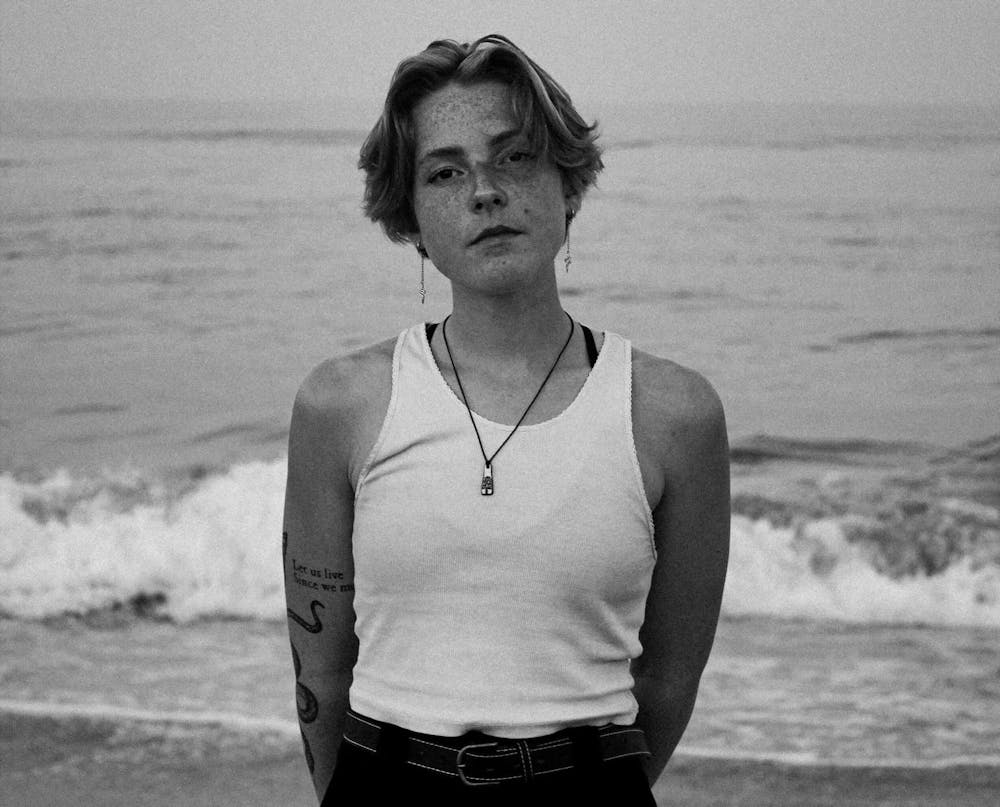The work of one of the University’s most notorious artists is not found on a canvas, in a gallery or hung on a wall. Instead, the tattoo art of fourth-year College student Sophia Indebetouw can be seen around Grounds and across Charlottesville if one knows where, and on whom, to look. Indebetouw has established herself as a prolific, innovative, creative body artist who has redefined common conceptions of the medium and its expectations.
Growing up, Indebetouw had an early interest in visual art — particularly for drawing in pen. From this point, she grew her affinity for the careful, calculated strokes and permanent nature of pen on paper, a habit that naturally lent itself to the medium of body art over time.
She attributes her love for art to the enjoyment she has gotten from drawing and doodling throughout her life. She also credits her mom for fostering and encouraging her craft from the beginning.
“My mom supports all projects and crafts of things, so I think she wanted me to explore it,” Indebetouw said. “Then it just got really fun. I started tattooing on fake skin, and then I started doing it on real skin.”
Indebetouw began her career as a tattoo artist during her first year on Grounds, when she was gifted a tattoo gun by her mother. What began as a hobby, slowly transformed into a passion for creating body art. She began tattooing herself during her first year at the University and has since developed an elaborate creative process involving intense design, editing and revising components — all of which, of course, takes place before ink is put to skin.
This past summer, Indebetouw began accepting commissions for the first time, sharing her craft and skill with people across the University and Charlottesville communities. Now, posting her work on the Instagram account @inked_by_soph, Indebetouw has taken her art to the public sphere.
It is the relationship and level of intimacy between a freelance creative such as Indebetouw and her clients — from the initial approach by the client, to the meticulous design, all leading up to the actual application of the ink — that distinguishes her art from more professional operations. Sophia Levine, a longtime friend and customer, spoke about how Indebetouw inspired her at all steps of the process, collaborating with her to ensure that her creative vision was fully executed.
“She offered to draw up a sketch of what I was thinking about, and then we worked together to edit it and fine tune it until it was exactly what I wanted,” Levine said. “I really appreciated having someone that would take that extra time to work on it with me and make sure that it was perfect.”
For Levine — and any of the people for whom Indebetouw creates a piece of art — the tattoo itself represents a powerful reminder of the valuable connection shared by the artist and her clients. Levine also expressed her appreciation for the intimate nature of receiving a tattoo from a freelance artist such as Indebetouw.
“I've had all my tattoos done by people that I knew, [and] I would say, I really value that experience.” Levine said. “It also feels like more of a mutually beneficial thing than when I'm coming into someone's workplace as a client versus coming into their personal space. It's just a very different environment and dynamic that I find a lot more appealing.”
Indebetouw says that tattoo art is a truly unique art form because of the steps taken before, during and after the ink is applied to ensure the creative vision is fully executed. This makes the relationship between the artist and her canvas singular when it comes to body art. Indebetouw explained how producing a piece of art a person chooses to carry with them for the rest of their life becomes a deeply personal experience.
“It's definitely a lot more personal,” Indebetouw said. “So maybe that's why I've become at least like friends [or] at least acquaintances with the people I've tattooed. Because you're putting something pretty personal and a kind of big decision on that person for the rest of their life.”
Due to the significance that accompanies any tattoo, perceptions have varied widely across cultures and throughout history. Though tattoos have developed a certain stigma, there have been technological innovations and rebellion movements that provoked a resurgence in tattoo art and culture.
Commenting on this modern shift in the perception of tattoos from an artist’s perspective, Indebetouw expressed gratitude that contemporary culture surrounding body art has become more positive and accepting, particularly at the University. However, she recognizes that it has not become a completely welcome practice in all walks of life.
“In the workforce, I think there definitely is [a stigma],” Indebetouw said. “I think it's going away a lot and becoming a lot more accepted.”... “[but society is] still not fully accepting of tattoos.”
Indebetouw is battling this stigma as a freelance artist, prioritizing the personal relationship between her and those whom she tattoos — creating art purely for art’s sake. This is an aspect of Indebetouw’s creativity that is particularly appealing to those who receive a tattoo from her demonstrating the importance for so many of supporting small, freelance tattoo artists as they would artists of any other medium.
As Indebetouw approaches the end of her time in college, she expressed interest in continuing her art as a hobby in the future. But the primary reason that Indebetouw likes the medium of tattoo art is simple.
“I just think they look cool,” she said. “I'm not going to say you don't look cool if you don't have tattoos, but I think it's a really cool way to express yourself.”
And that passion, much like a tattoo itself, is something that never goes away.







